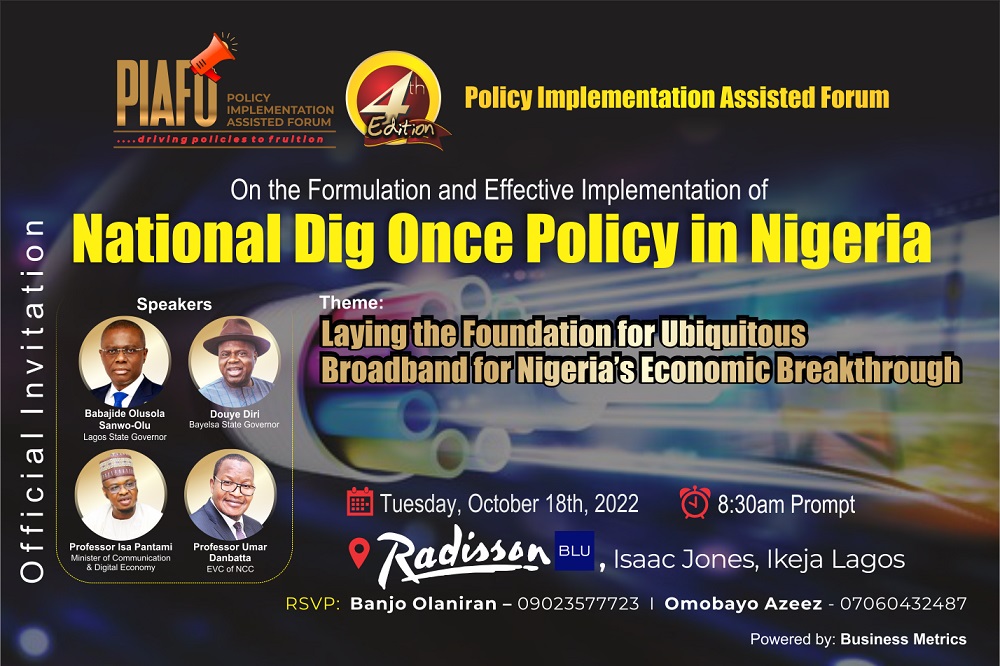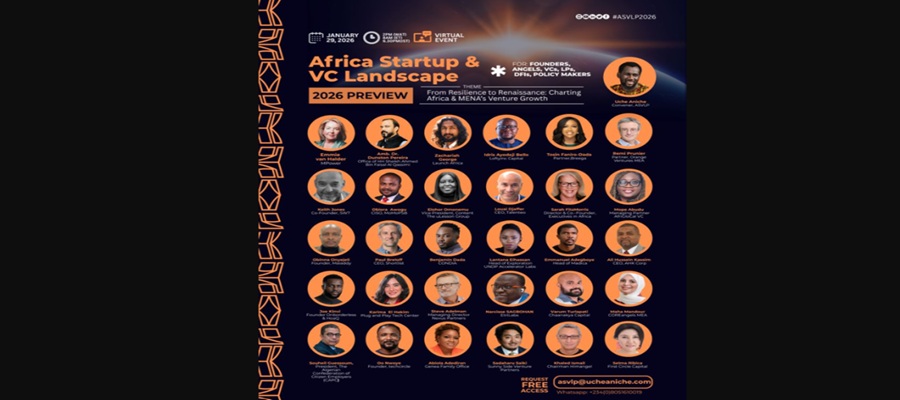Telecom
PIAFo Set for Dig Once Policy Summit to Boost Fibre Deployment

Organisers of Policy Implementation Assisted Forum (PIAFo) have concluded plans to dissect issues around formulation and effective implementation of National Dig Once Policy in Nigeria to boost fibre deployment across the country.

The summit, powered by Business Metrics Nigeria, is slated for Tuesday, October 18, 2022, at Radisson Blu Hotel, GRA, Ikeja Lagos, with the theme: Laying the Foundation for Ubiquitous Broadband for Nigeria’s Economic Breakthrough.
To lead the Dialogue, Professor Isa Pantami, the Minister of Communications and Digital Economy, is billed to deliver the keynote address, while Professor Umar Danbatta, the Executive Vice Chairman of the Nigerian Communications Commission will also deliver a paper on a related topic.
According to the organisers of the forum which is now in its fourth edition, implementing a National Dig Once Policy will give Nigeria the right footing required to deliver last mile broadband infrastructure to every part of the country.
The objective of a Dig Once Policy is to facilitate the provision of ready-made buried conduits across the country to allow seamless fibre deployment by reducing costs and removing unnecessary duplication.
Fibre is a critical element of backbone infrastructure for broadband and connectivity in pursuit of Nigeria’s digital economy.
Interestingly, the policy has become inevitable to meet the targets set by the Federal Government in its National Broadband Plan (NBP) 2020-2025, wherein the country targets 40% and 60% fibre to towers by 2023 and 2025 respectively from a paltry 10% in 2020.
The Plan further seeks to attain 90,000km and 120,000km of non-overlapping fibre infrastructure by 2023 and 2025 respectively from just 40,000km in 2020.
Meanwhile, the Nigerian Communications Commission (NCC) reported that as at the end of 2021, total fibre Optics so far deployed in Nigeria stood at 74,947km, including 47,128.7km on-land and 27,818.3km submarine
However, by meeting the NBP targets through initiatives such as the Dig Once Policy, public institutions such as schools and hospitals and private enterprises in the country’s 774 local governments can be easily connected to broadband and enjoy internet speed of up to 25 megabyte per second in the urban and 10 megabyte per second in rural areas by 2025.
Government intends to deliver this to 95% of the local government areas through fibre, leveraging satellite technology for the remaining 5%.
“We believe these targets and the possibility of a smart city can only come to fruition through collaborative efforts among federal, state, local government authorities and private sector players.
“This is what the Dig Once Policy Intends to achieve,” says Omobayo Azeez, PIAFo Lead Executive and Editor of Business Metrics.
“We have dedicated this edition of the summit to dialogue around the Dig Once Policy to contribute to the formulation of the policy and ensure that those who have roles to play in implementing are carried along to create awareness and understanding as well as eliminate possibilities of revolt against the policy,” he added.
According to him, expected speakers and guests at the summit include governors, the leadership of the Nigeria Governors’ Forum (NGF), telecom operators, undersea cable operators, Galaxy Backbone, Infrastructure Concession Regulatory Agency, Lagos State Infrastructure Maintenance and Regulatory Agency, Broadband Implementation Steering Committee, and Association of Local Governments of Nigeria, among others.
Azeez further stated that the event is endorsed by the Association of Telecommunication Companies of Nigeria (ATCON), Association of Licensed Telecom Operators of Nigeria (ALTON), and the Nigeria Internet Group (NIG) whose chiefs and members would also be participating in the event.
“BusinessMetrics has created the PIAFo initiative as a mid-point dialogue platform among stakeholders for policy advocacy, implementation and assessment across various sectors,” he concluded.
Telecom
ASVLP 2026: Africa, MENA VCs Gear Up as Tech Funding Hits $4.1bn Rebound

As Africa and MENA’s startup ecosystems transition from post-correction resilience into a new phase of disciplined growth, the Africa Startup & VC Landscape Preview (ASVLP 2026) will convene leading founders, investors, policymakers, and ecosystem builders on January 29, 2026, for its second annual, agenda-setting virtual forum.

Following a challenging global venture cycle, 2025 marked a notable rebound across the African ecosystem, with startups raising an estimated $3.2–$3.3 billion over the full year.
The recovery was accompanied by significant structural shifts: Kenya emerged as the leading destination among Africa’s “Big Four” markets for the first time, while Nigeria recorded a year-on-year funding decline, reflecting changing investor preferences, macroeconomic pressures, and a broader recalibration toward capital efficiency and sustainability.
Sectorally, fintech remained the most funded vertical, while climate & energy, AI-enabled solutions, healthtech, and infrastructure-adjacent businesses gained increasing attention. Across Africa and MENA, development finance institutions (DFIs) and family offices played a more pronounced role in anchoring funds, deploying catalytic capital, and supporting blended-finance structures, reshaping how early-stage and growth capital is mobilized.
ASVLP 2026 is designed to translate these data points into forward-looking strategy.
The forum will bring together venture capitalists, angel investors, LPs, DFIs, family offices, founders, corporate leaders, and regulators from Africa, MENA, Europe, and North America to assess 2025 outcomes and chart priorities for 2026.
The program will feature keynotes, fireside chats, panels, and deep-dive roundtables, including discussions on:
· The 2026 Africa & MENA FinTech Landscape, focusing on security, profitability, regulation, and growth frontiers
· Emerging Fund Managers, capital formation, and LP alignment
· Talent, operator depth, and institutional capacity as constraints to scale
· Regulatory evolution and cross-border market integration
A major highlight of ASVLP 2026 will be the Final DealRoom Pitch Session, where a curated group of high-potential startups will present to an experienced panel of investors.
• Founders can apply to pitch via: bit.ly/ASVLP-DR-Founders
• Investors seeking DealRoom access can request entry via: bit.ly/ASVLP-DR-Investors
Confirmed speakers for ASVLP 2026 include Khaled Ismail (HIMangel), Idris Ayodeji Bello (LoftyInc Capital), Zachariah George (Launch Africa), Tosin Faniro-Dada (Breega), Selma Ribica (FirstCircle Capital), Maha Mandour (COREangels MEA), Joe Kinvi (Borderless), Remi Prunier (Orange Ventures MEA), Karima El Hakim (Plug and Play Tech Center), Souheil Guessoum (President, The Confederation of Citizen Employers – Algeria (CAPC)), Remi Prunier (Partner, Orange Ventures, MEA), Maha Mandour (COREAngels MEA), Ali Hussein (President, Kenyan FinTech Association), Patrick Okebu (CIO, Interswitch Group) among other leading voices shaping capital, policy, and innovation across the region.
“The conversation has shifted,” said Uche Aniche, Convener of ASVLP. “It’s no longer about whether capital will return to Africa and MENA, but what kind of capital, deployed with what discipline, and in service of which long-term outcomes. ASVLP exists to help the ecosystem make sense of that transition.”
Participation in ASVLP 2026 is free but strictly by invitation.
Interested participants are encouraged to repost the official announcement on LinkedIn and comment #ASVLP2026 to receive a private registration link. They could also email [email protected] and request invite.
Telecom
TikTok, Instagram Blamed in US Youth Suicide Lawsuit

Major social media giants Meta Platforms, TikTok and Alphabet’s YouTube will face a landmark jury trial this week in Los Angeles County Superior Court over allegations that their addictive designs have fuelled a youth mental health crisis, marking the first such case to reach this stage.

Social Media
The pivotal personal injury lawsuit centres on a 19-year-old Californian woman identified as K.G.M., who claims her childhood immersion in Instagram, Facebook, YouTube and TikTok—engineered with endless scrolls, autoplay videos, notifications and algorithms—sparked severe anxiety, depression and suicidal thoughts.
Dozens of similar suits have surged since 2022 from families, schools and states, accusing the firms of burying internal research on teen harms while prioritising ad revenue through youth-targeted engagement hooks, despite Section 230 protections for user content.
Plaintiffs seek damages and design overhauls, arguing platforms bypassed parents and preyed on vulnerable kids; defendants counter there’s no clinical “social media addiction” diagnosis, no proven causation—kids with issues often use less—and they’ve added safeguards like parental controls and time limits.
Echoing Australia’s under-16 bans, the trial will scrutinise thousands of internal documents, expert testimonies and K.G.M.’s story, potentially expanding tech liability amid debates where studies show complex links, not direct causation, between screen time and disorders like eating issues or self-harm.
A win could mandate warning labels, age gates or algorithm tweaks, reshaping global platforms as U.S. Surgeon General advisories and global scrutiny intensify pressure on Big Tech to prioritise child safety over profits.
Telecom
Meta Tests Paid Subscriptions Across Instagram, Facebook, WhatsApp

Meta is gearing up to trial paid subscription services on Instagram, Facebook, and WhatsApp, aiming to diversify revenue streams beyond advertising while maintaining free core access for all users.

Meta
The subscriptions will offer enhanced tools tailored for everyday users, creators, and businesses, including advanced content creation, sharing, and workflow features distinct from the existing Meta Verified verification program. Unlike a uniform rollout, Meta plans varied testing formats per app to match diverse audiences, experimenting with feature bundles based on user feedback to refine the model.
A key element involves integrating Manus, the autonomous agent firm Meta acquired for $2 billion in December, into these apps alongside its enterprise sales. Manus enables complex task automation with minimal input, with early signs like Instagram shortcuts already spotted by reverse engineer Alessandro Paluzzi.
Video tools feature prominently: Meta’s Vibes short-form video generator in the Meta AI app shifts to freemium, where paid tiers unlock higher monthly creation limits beyond the free baseline. On Instagram, subscriptions could enable unlimited audience lists, non-follower tracking, and anonymous Story views, though specifics for Facebook and WhatsApp remain under wraps.
Drawing from Meta Verified’s 2023 launch—which provides badges, support, and protection mainly for creators—these broader plans target wider appeal amid industry shifts. Ad growth slows against TikTok competition, while Snapchat+ boasts 16 million subscribers at $3.99 monthly, proving demand for value-driven paid perks despite subscription fatigue risks from streaming and storage fees.
Meta will phase tests gradually, prioritizing feedback to shape long-term viability without alienating free users.

 News3 days ago
News3 days agoLIRS to Invoke NTAA to Recover Unpaid Taxes from Bank Accounts, Others

 News3 days ago
News3 days agoAnambra Cuts Monday Pay to Kill Sit-at-Home

 E-Financial3 days ago
E-Financial3 days agoNIBSS, Others Flag 13,417 Nigerian Fraudsters on Person of Interest Portal

 E-Financial3 days ago
E-Financial3 days agoFirst Asset Management Receives Upgraded Ratings from Agusto &Co and DataPro

 E-Financial3 days ago
E-Financial3 days agoCBN Prepares Fresh Debit Card Rules to Improve ATM Services

 General News3 days ago
General News3 days agoNigeria Treats Religious Violence as Attack on State – NSA Ribadu

 E-Financial2 days ago
E-Financial2 days agoCBN Upgrades Licences of Opay, Moniepoint, Kuda, Palmpay, Paga to National Status
- E-Financial2 days ago
Nigeria’s 9 Top FinTech Firms Valued at $10.6Bn in January 2026

























